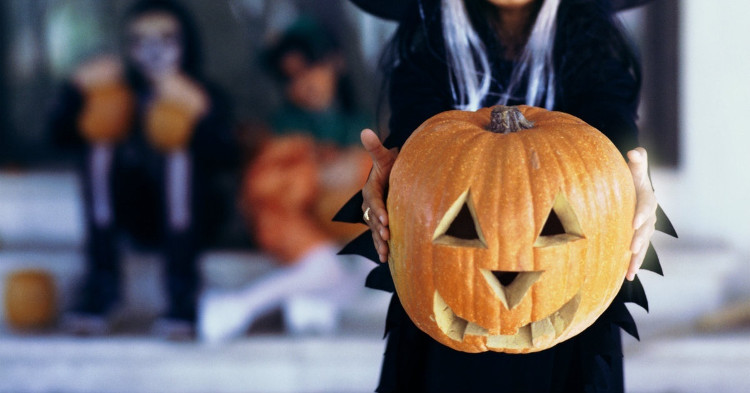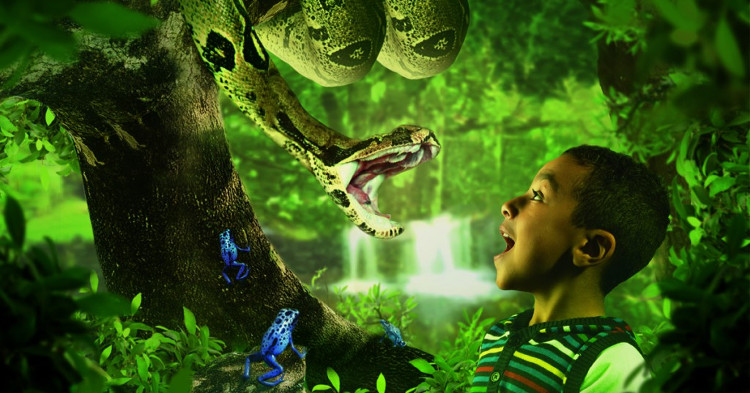The reason many people are excited with the fear of the devil
Fear is a natural reaction to dangers, while giving a feeling that many people enjoy.
Halloween festival takes place on October 31 every year is a highly anticipated event, although this festival originates from the original fear of people before supernatural phenomena such as demons.

Many people like to experience fear.(Photo: Crosswalk).
According to psychologists at Wayne State University, America, fear is an instinctive response to protect us from threats, but it can also bring excitement to many people because they can escape. from everyday thoughts or when they overcome fear, Independent on October 29 reported.
The fear reaction originates from the brain and spreads throughout the body, creating the necessary changes to defend or escape. Specifically, fear of formation in the amygdala is in the temporal lobe, the brain region is responsible for detecting emotional changes created by stimulants.
The fear stimulant triggers a fear of amygdala, activating areas involved in the preparation of the motor functions needed to fight or flee. It also releases stress hormones and stimulates the sympathetic nervous system, helping the body change to better prepare for dangerous situations.

The fear reaction originates from the brain, then spreads throughout the body.(Photo: BN1 Magazine).
The brain becomes highly alert, the pupils of the eyes widen, the bronchi relaxes, the breathing begins to fold. Heart rate and blood pressure increased. Blood and glucose circulation to the skeletal muscles also increases. These organs are not essential in the moment of survival as the intestinal tract decreases activity.
The hippocampus is the part of the brain that is closely connected to the amygdala. The hippocampus and the prefrontal cortex help the brain understand the threats. These units participate in the process of handling higher-order situations, helping people to identify a real or fake threat.
For example, when you encounter a wild lion, people can experience intense feelings of fear. However, the reaction to seeing that lion in the zoo was prone to curiosity or excitement.
Similar to animals, people often learn to feel fear through personal experiences, such as fear of dogs if ever bitten by dogs. However, people are afraid through an advanced and unique method, which is through language instruction. For example, people will become wary and afraid when they see a dog warning sign.
One reason many people like the feeling of fear is that it causes distraction. When a frightening situation occurs, people will be on high alert and no longer think about everyday problems such as workplace troubles or worry about upcoming exams.

A positive feeling can "spread" when experiencing the same fear with others.(Photos: Pinterest).
In addition, emotions can also spread positively when experiencing this frightening situation with others. For example, when you see someone walking in a haunted house moving from yelling to laughing, you will also be infected with a happy feeling.
The key factor links individual factors such as situations, distractions or social contagion to the sense of control. When the brain realizes that the threat is real or fake, "labeling" the experience and enjoying the excitement, we find ourselves in control of the situation.
When we overcome the initial fear response, we often feel satisfied, reinforce the sense of security and be more confident about the ability to deal with something that causes panic.
Each person will have different feelings about scary or exciting things. If the person sees a very real threat, an extreme fear reaction may overwhelm the sense of control of the situation. On the other hand, if the experience is not enough to stimulate the emotional part of the brain, or if it is too unreal for the part of the brain to perceive, that experience can cause boredom.
- Why does darkness make people afraid?
- 7 most common fears in the world! Try reading if you have a friend in it?
- 8 bizarre fears of humans
- Fear of confusion
- Strange fear syndrome that you may be suffering from but don't know how to call
- The habit of lying formed from living environment?
- 6 ways to help you control fear
- Strange fears of people in life
- The fear of learning mathematics: Why do 42 million people suffer?
- 5 strange fear syndrome of people
- Why are so many people afraid of dark?
- Finding out the real reason makes us afraid of dentists
 'Fine laughs' - Scary and painful torture in ancient times
'Fine laughs' - Scary and painful torture in ancient times The sequence of numbers 142857 of the Egyptian pyramids is known as the strangest number in the world - Why?
The sequence of numbers 142857 of the Egyptian pyramids is known as the strangest number in the world - Why? History of the iron
History of the iron What is alum?
What is alum? Why are people not afraid of animal corpses but afraid of human corpses?
Why are people not afraid of animal corpses but afraid of human corpses?  Fear - 'a great tool' of innate survival mechanism
Fear - 'a great tool' of innate survival mechanism  Does science have a way to help 'turn off' fear?
Does science have a way to help 'turn off' fear?  What predators do ungulates in Africa fear the most?
What predators do ungulates in Africa fear the most?  What is Somniphobia?
What is Somniphobia?  What is fear of ghosts? How to stop being afraid of ghosts?
What is fear of ghosts? How to stop being afraid of ghosts? 